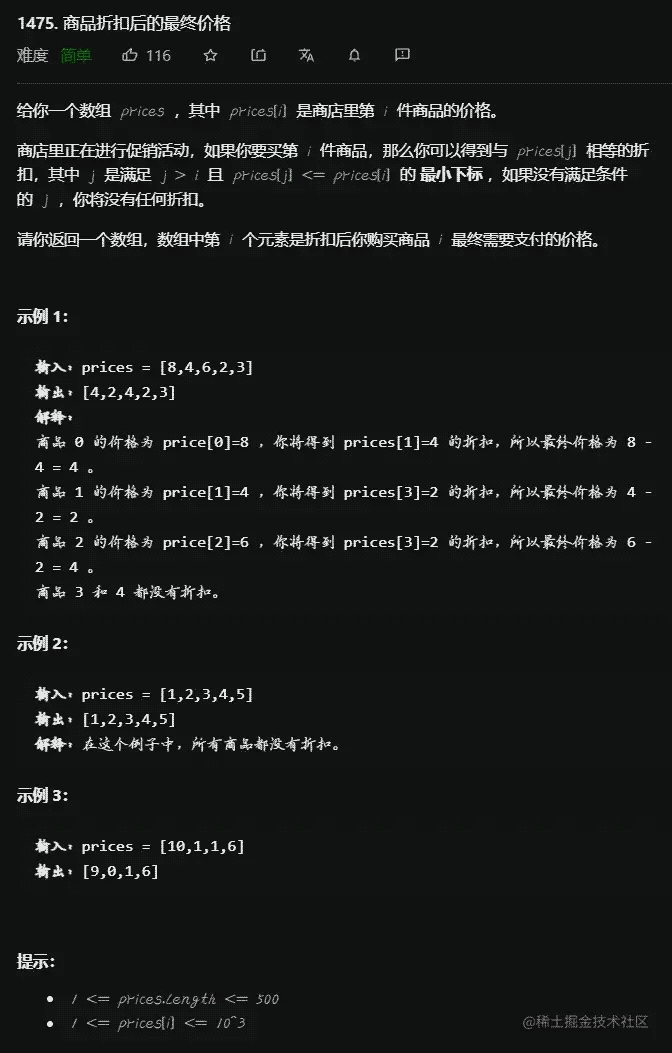Java C++ 算法题解leetcode145商品折扣后最终价格单调栈
目录
- 题目要求
- 思路一:暴力模拟
- Java
- C++
- Rust
- 思路二:单调栈
- Java
- C++
- Rust
题目要求

思路一:暴力模拟
- 由于数据范围不算离谱,所以直接遍历解决可行。
Java
class Solution {
public int[] finalPrices(int[] prices) {
int n = prices.length;
int[] res = new int[n];
for (int i = 0; i < n; i++) {
int discount = 0;
for (int j = i + 1; j < n && discount == 0; j++) {
if (prices[j] <= prices[i])
discount = prices[j];
}
res[i] = prices[i] - discount;
}
return res;
}
}
- 时间复杂度:O(n^2)
- 空间复杂度:O(n)
C++
class Solution {
public:
vector<int> finalPrices(vector<int>& prices) {
int n = prices.size();
vector<int> res(n);
for (int i = 0; i < n; i++) {
int discount = 0;
for (int j = i + 1; j < n && discount == 0; j++) {
if (prices[j] <= prices[i])
discount = prices[j];
}
res[i] = prices[i] - discount;
}
return res;
}
};
- 时间复杂度:O(n^2)
- 空间复杂度:O(n)
Rust
impl Solution {
pub fn final_prices(prices: Vec<i32>) -> Vec<i32> {
let n = prices.len();
let mut res = vec![0;n];
(0..n).for_each(|i| {
res[i] = prices[i] - ((i + 1)..n).find(|&j| prices[j] <= prices[i]).map_or(0, |j| prices[j]);
});
res
}
}
- 遍历存每次的count,最后再遍历计算得出结果
impl Solution {
pub fn final_prices(prices: Vec<i32>) -> Vec<i32> {
let n = prices.len();
let mut discount = vec![0;n];
for j in 1..n {
for i in 0..j {
if discount[i] == 0 && prices[j] <= prices[i] {
discount[i] = prices[j];
}
}
}
prices.iter().zip(discount.iter()).map(|(&x, &y)| x - y).collect::<Vec<i32>>()
}
}
- 时间复杂度:O(n^2)
- 空间复杂度:O(n)
思路二:单调栈
- 是个逆向思维,不考虑谁是我的折扣,而去考虑我可以是谁的折扣。已知的一个prices[j]只能折扣其左边最近的几个大于它的值,按这个思路分析单调和栈:
- 从前向后依次遍历prices,遇到需要打折的商品,将其下标放入一个容器:
- 若当前处理值小于末尾,那么它就可以作为末尾元素的折扣【因为它是末尾元素后面第一个小于它的值】,将末尾元素取出、折扣、放入已折扣数组(即结果数组),一直重复到容器末尾元素小于当前处理值,则将当前处理值放入容器【为避免该值不可打折造成缺漏,此时将其价格同步至已折扣数组】。
- 若当前处理的值高于容器内的值,那么它不能作为里面任何一者的折扣,因此直接加入容器。
- 由此可知,加入容器值会大于容器内的其它值,该容器是单调递增的。此外,处理的一直是容器末尾的元素,添加也是直接补在末尾,所以符合栈的结构。
- 从前向后依次遍历prices,遇到需要打折的商品,将其下标放入一个容器:
Java
class Solution {
public int[] finalPrices(int[] prices) {
int n = prices.length;
int[] res = new int[n]; // 已打折价格
Deque<Integer> sta = new ArrayDeque<>(); // 待打折下标
for (int i = 0; i < n; i++) {
while (!sta.isEmpty() && prices[sta.peekLast()] >= prices[i]) {
int idx = sta.pollLast();
res[idx] = prices[idx] - prices[i];
}
sta.addLast(i); // 最高
res[i] = prices[i];
}
return res;
}
}
- 时间复杂度:O(n)
- 空间复杂度:O(n)
C++
class Solution {
public:
vector<int> finalPrices(vector<int>& prices) {
int n = prices.size();
vector<int> res(n); // 已打折价格
stack<int> sta; // 待打折下标
for (int i = 0; i < n; i++) {
while (!sta.empty() && prices[sta.top()] >= prices[i]) {
int idx = sta.top();
sta.pop();
res[idx] = prices[idx] - prices[i];
}
sta.push(i); // 最高
res[i] = prices[i];
}
return res;
}
};
- 时间复杂度:O(n)
- 空间复杂度:O(n)
Rust
impl Solution {
pub fn final_prices(prices: Vec<i32>) -> Vec<i32> {
let n = prices.len();
let mut res = vec![0;n]; // 已打折价格
let mut sta = vec![]; // 待打折下标
for i in 0..n {
while let Some(&idx) = sta.last() {
if prices[idx] < prices[i] {
break;
}
sta.pop();
res[idx] = prices[idx] - prices[i];
}
sta.push(i); // 最高
res[i] = prices[i];
}
res
}
}
- 时间复杂度:O(n)
- 空间复杂度:O(n)
以上就是Java C++ 算法题解leetcode145商品折扣后最终价格单调栈的详细内容,更多关于Java C++ 商品折扣后价格的资料请关注我们其它相关文章!
赞 (0)

